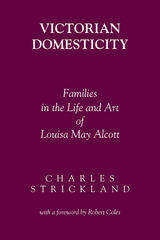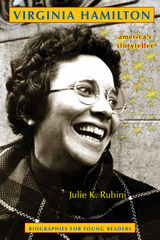3 start with V start with V

The subject of Victorian Domesticity is family life in America. The life and works of Louisa May Alcott served as the vehicle for exploring and analyzing this subject. Although Alcott was deeply influenced by popular currents of sentimentality, her own experience exposed her to the confusions and contradictions generated when sentiment confronted the reality of life in 19th-century America.
In the first chapter Strickland outlines the ways in which sentimentality colored the perception of 19th-century Americans about such issues as courtship, marriage, the relationship between the sexes, generational relationships, and the relationship between the nuclear family and the community outside the family. Chapters two and three trace Alcott’s childhood and adolescent experiences, exploring the tensions that developed between Louisa and her father, and detailing the ways in which she carried the double burden of being both poor and female as she sought her identity as a writer.
The following six chapters treat the varieties of family life that appear in Alcott’s stories, the impact of feminism on her life, and her emphasis on the importance of child nurture. In the final two chapters the author treats the relationships that Alcott perceived between the family and the world around it and assesses the legacy of the Victorian family idea.

A Bank Street College of Education Best Children’s Book of 2018 (Outstanding Merit selection) • Finalist, 2018 Ohioana Book Award
Long before she wrote The House of Dies Drear, M. C. Higgins, the Great, and many other children’s classics, Virginia Hamilton grew up among her extended family near Yellow Springs, Ohio, where her grandfather had been brought as a baby through the Underground Railroad. The family stories she heard as a child fueled her imagination, and the freedom to roam the farms and woods nearby trained her to be a great observer. In all, Hamilton wrote forty-one books, each driven by a focus on “the known, the remembered, and the imagined”—particularly within the lives of African Americans.
Over her thirty-five-year career, Hamilton received every major award for children’s literature. This new biography gives us the whole story of Virginia’s creative genius, her passion for nurturing young readers, and her clever way of crafting stories they’d love.

Hailing from the small river town of Moundsville, West Virginia, Davis Grubb (1919–1980) became a key figure in the canon of Appalachian literature. The author of ten novels and dozens of short stories and radio plays, Grubb’s writings, as Tom Douglass observes, “catalogued his life”—and a turbulent life it was, marked by the traumatic loss of both the family home and his father during the Great Depression, the overbearing affections of his mother, the fear of failure, painful struggles with alcohol and drug abuse, profligate spending, and a conflicted sexuality.
Grubb originally aspired to be a visual artist but, thwarted by color blindness, turned to writing instead, honing his skills in the advertising industry. Today he is best remembered for his first novel, The Night of the Hunter (1953), a gripping story of a Depression-era serial killer and his pursuit of two young children along the Ohio River. This book spent twenty-eight weeks on The New York Times best-seller list and became the basis for a classic film directed by Charles Laughton, starring Robert Mitchum, Shelley Winters, and Lillian Gish. While his subsequent work never achieved that same level of popularity, the fierce thematic oppositions he set forth in his debut novel—between love and hate, good and evil, the corrupt and the pure, the rich and the poor—would inform his entire oeuvre. Although Grubb’s career took him to the great cities of New York, Philadelphia, and Los Angeles, his work was always rooted in key emblems of his Appalachian childhood—the river, the state penitentiary, and the largest Indian mound east of the Mississippi, all in his native Moundsville.
In his works, Douglass asserts, Grubb was “an avenging angel, righting the wrongs of the past in his own life, in his own country, and putting trust in his own vision of divine love.” Off the page, he was riven by personal demons, “more than once in danger of losing his life to self-annihilation and to the self-accusation that he was a fallen angel.” This biography, the first ever written of Grubb, captures his life and work in all their intriguing complexity.
THOMAS E. DOUGLASS, an associate professor of English at East Carolina University, is the author of A Room Forever: The Life, Work, and Letters of Breece D’J Pancake. He is also the fiction editor for the University of Tennessee Press’s Appalachian Echoes series.
READERS
Browse our collection.
PUBLISHERS
See BiblioVault's publisher services.
STUDENT SERVICES
Files for college accessibility offices.
UChicago Accessibility Resources
home | accessibility | search | about | contact us
BiblioVault ® 2001 - 2024
The University of Chicago Press









